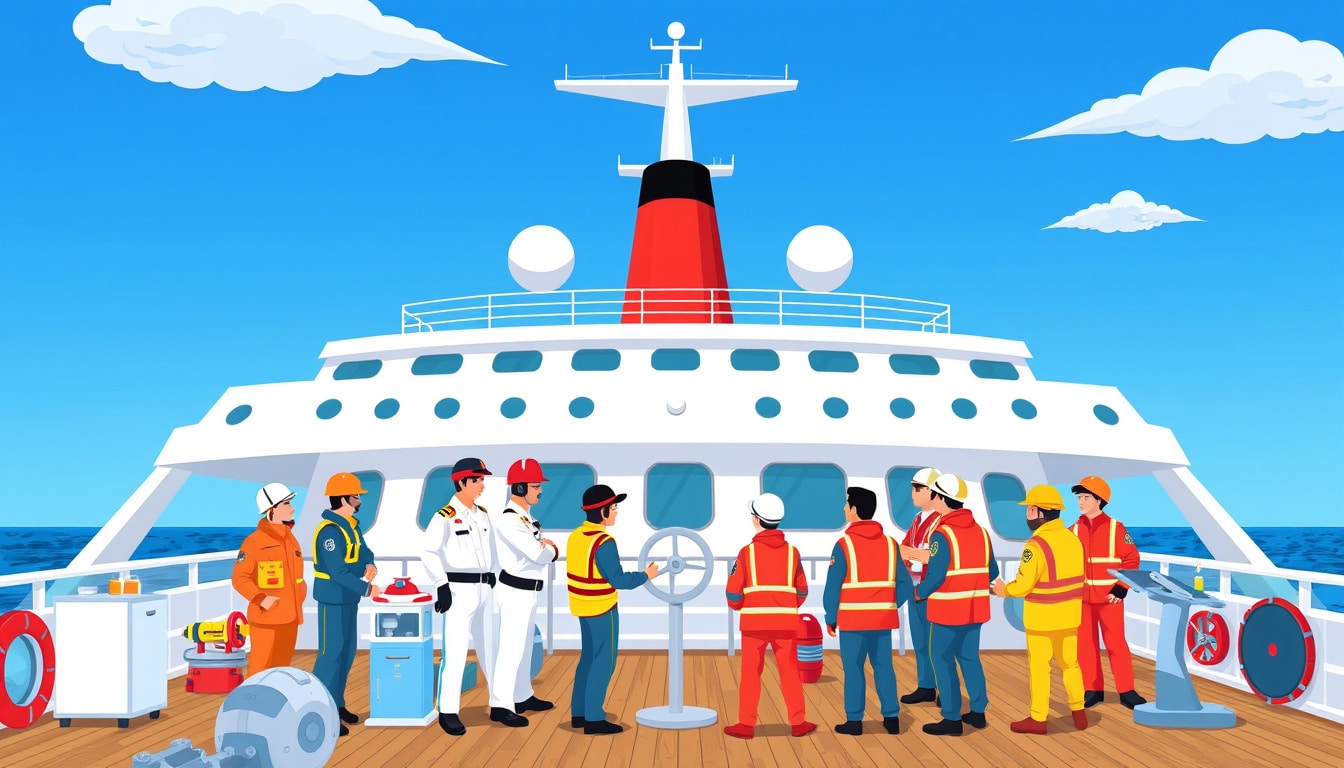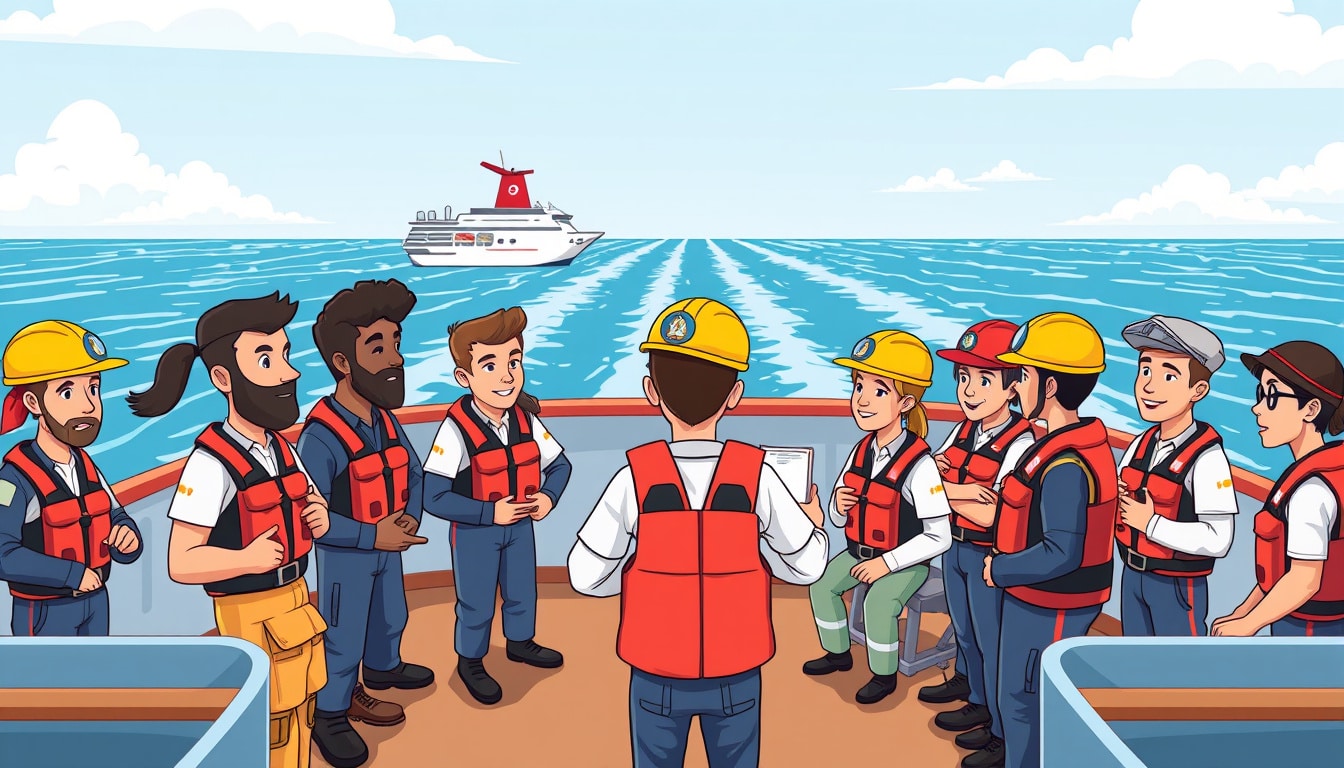In the modern maritime industry, seafarers face a myriad of threats that can compromise the safety of vessels, crew, and cargo. As the world becomes increasingly interconnected, the risks at sea are evolving, making it essential for all seafarers to be equipped with the right knowledge and skills. This is where Security Awareness Training for all Seafarers (PSA) plays a crucial role. In this article, we will explore 5 reasons why such training is vital for all seafarers, focusing on understanding the risks at sea, compliance with regulations, enhancing responses to security threats, and fostering a security-conscious culture on board. Proper training not only protects the individuals involved but also fortifies the maritime industry’s resilience against potential threats.
Learn more about our Courses here!
Key Takeaways
- Security awareness training equips seafarers with knowledge to identify and mitigate risks at sea.
- Compliance with maritime security regulations is essential for the safety and legal operation of vessels.
- Effective training enhances crews’ responses to security threats, increasing overall safety.
- A strong security-conscious culture on board fosters vigilance and proactive behavior among crew members.
- Regular security awareness training supports continuous improvement in maritime security practices.
Understanding the Risks at Sea
In the vast and unpredictable environment of the ocean, ensuring safety and security is of utmost importance for seafarers. 5 reasons security awareness training for all seafarers (PSA) is vital for all seafarers can be summarized as follows: First, it equips crew members with essential skills to identify potential threats, enhancing their ability to respond effectively to emergencies. Second, security awareness training fosters a culture of vigilance and teamwork, which is critical for maintaining safety on board. Third, the training programs often include knowledge of the legal implications of maritime security, helping seafarers understand their responsibilities under international law. Fourth, this type of training prepares seafarers to deal with piracy and other criminal activities that are prevalent in certain maritime zones, ultimately reducing risks to both personnel and cargo. Lastly, an investment in security training reinforces the reputation and reliability of shipping companies, leading to better operational outcomes and adherence to industry standards. In summary, prioritized and thorough security awareness training for all seafarers is not just a regulatory requirement, but a crucial strategy to safeguard lives and assets at sea.
The Importance of Compliance with Regulations
In the fast-paced maritime industry, ensuring that all seafarers are well-versed in safety and security protocols is non-negotiable. The significance of compliance with regulations cannot be overstated, particularly given the rise of threats in marine environments. This is where security awareness training for all seafarers (PSA) plays a crucial role. Here are 5 reasons why this training is vital: firstly, it empowers crew members with essential knowledge about recognizing potential threats, which is crucial for maintaining a secure operational environment. Secondly, it fosters a culture of safety onboard, ensuring that every seafarer understands their responsibilities in upholding safety standards and regulatory compliance. Thirdly, comprehensive training helps mitigate risks associated with human error, which can often lead to severe consequences at sea. Fourthly, being compliant with industry regulations enhances the reputation of shipping companies, demonstrating a commitment to safety and security that builds trust with clients and stakeholders. Lastly, in a world where maritime laws are continuously evolving, ongoing security awareness training ensures that all personnel are up-to-date with the latest regulations and best practices. Overall, implementing security awareness training for all seafarers is not just a regulatory requirement but a strategic advantage in safeguarding lives and assets at sea.
Learn more about our Courses here!
Enhancing Response to Security Threats
In today’s complex maritime environment, enhancing response to security threats is paramount, which is why there are 5 reasons Security Awareness Training for All Seafarers (PSA) is vital for all seafarers. First, it establishes a foundational understanding of security risks, allowing maritime professionals to recognize potential threats before they escalate. Second, the training equips seafarers with the necessary skills to respond effectively during a security incident, fostering a culture of vigilance. Third, by implementing regular security awareness training, companies can comply with international regulations, enhancing their reputation and operational integrity. Fourth, the training promotes teamwork and communication among crew members, which is essential for coordinated responses to security situations. Lastly, investing in Security Awareness Training demonstrates a commitment to the safety and well-being of crew members, ultimately protecting assets and minimizing risks. Overall, embracing these 5 reasons not only strengthens individual competencies but also fortifies the maritime industry’s resilience against evolving security challenges.
Building a Security-Conscious Culture on Board
In today’s rapidly evolving maritime industry, establishing a security-conscious culture on board is pivotal, especially with the increasing threats to maritime security. One effective way to foster this culture is through comprehensive security awareness training for all seafarers. Here are 5 reasons why security awareness training (PSA) is vital for all seafarers. First, it empowers crew members with the knowledge they need to recognize and respond to potential security threats, transforming them into the first line of defense against piracy and cyberattacks. Second, it promotes personal accountability; when every seafarer understands their role in maintaining security, it fosters a collective responsibility that permeates the entire crew. Third, periodic training ensures that all personnel are up-to-date with the latest security protocols and compliance measures, which is crucial in an industry where regulations are constantly evolving. Fourth, such training encourages open communication among crew members regarding security concerns, allowing for a collaborative environment that can preemptively address potential issues. Lastly, investing in security awareness training bolsters the reputation of the shipping company, as it demonstrates a commitment to the safety and well-being of both crew members and cargo. In conclusion, ensuring that all seafarers undergo security awareness training is not only a regulatory requirement but a strategic imperative for fostering a safer maritime environment.
À Propos de Nous
Académie Maritime Virtuelle (VMA) is a leading provider of online maritime education and training, offering a wide range of courses designed to meet the needs of the global maritime industry. With a commitment to quality and innovation, Virtual Maritime Academy is dedicated to preparing seafarers and maritime professionals for success in their careers. Now a DNV Certified Maritime Training Provider, the academy upholds the highest standards of excellence in training and education.









